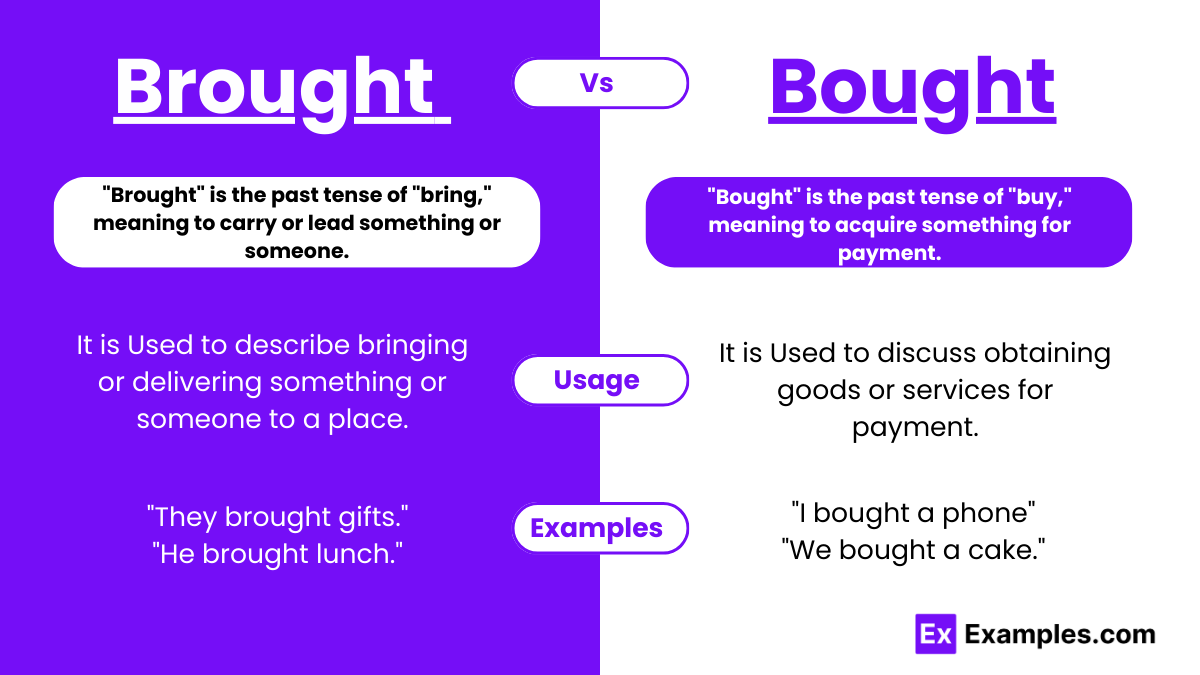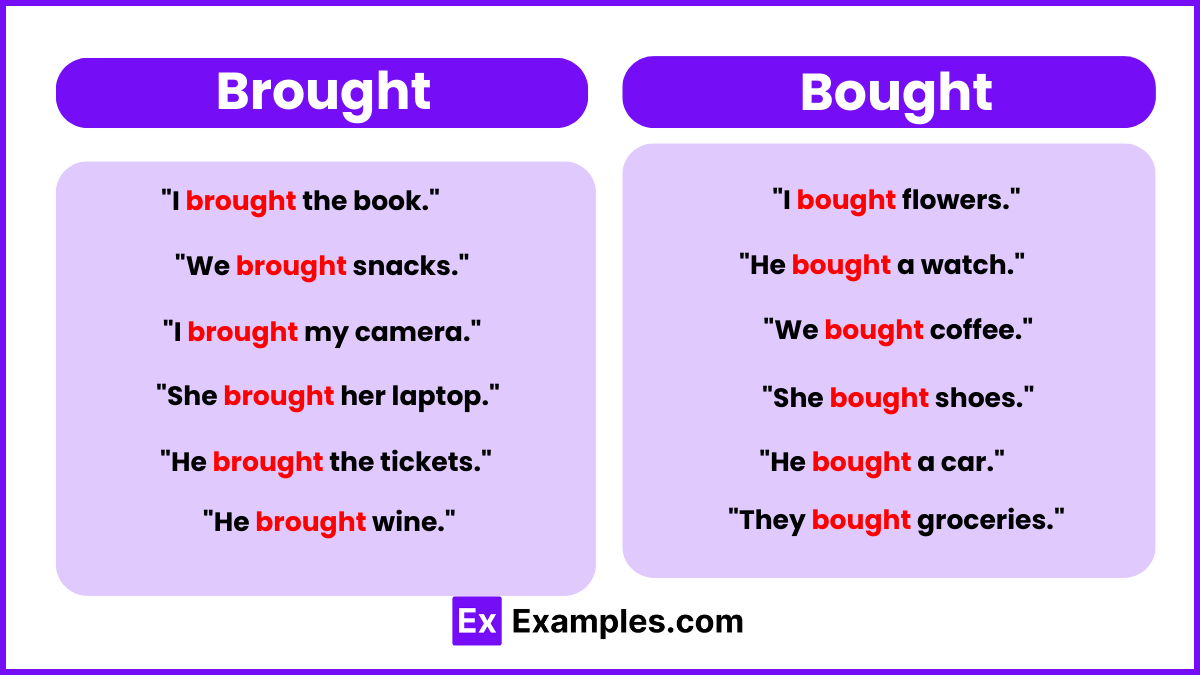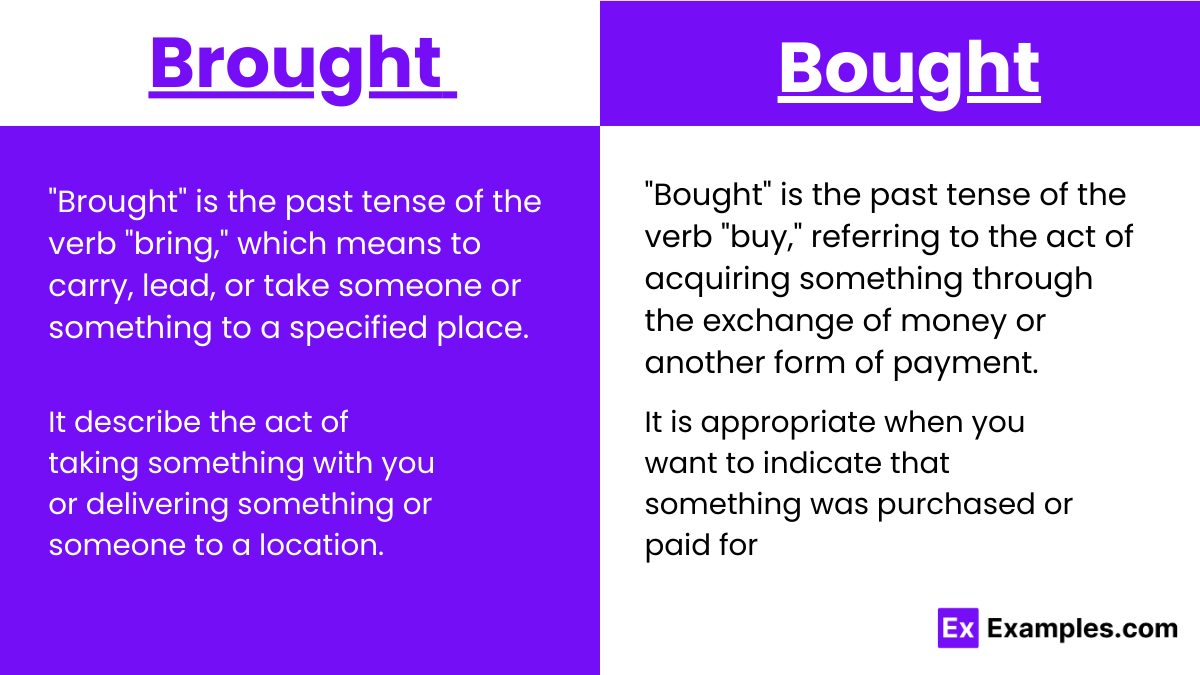Brought vs Bought
Navigating the intricacies of the English language, students often encounter the challenge of differentiating between the verbs “brought” and “bought.” These two words, though similar in spelling and pronunciation, carry distinct meanings that can significantly alter the message of a sentence. Both belonging to the category of irregular verbs and featuring the perplexing -ough- construction, they present a notorious hurdle in terms of both spelling and pronunciation. This commonality in form but divergence in function highlights the importance of understanding their respective uses and nuances to communicate effectively and accurately.
The key to mastering the use of “brought” and “bought” lies in recognizing their definitions and the contexts in which they are applied. “Brought,” the past tense of “bring,” refers to the action of taking or carrying someone or something to a place, while “bought,” the past tense of “buy,” involves acquiring something in exchange for payment. Both are past tense verbs, denoting actions that have already occurred, and serve as past participles when used independently. As fundamental components of English verb tense structure, a clear grasp of “brought” and “bought” empowers students to express past actions with precision, enhancing their overall linguistic competence.
Brought and Bought – Meaning
Brought –“Brought” is the past tense form of the verb “bring,” which means to carry, lead, or cause someone or something to come along to a place or towards the speaker. The action described by “brought” involves moving or transporting objects or people from one location to another. It emphasizes the act of transfer or conveyance, highlighting the movement towards a specific destination or to the presence of someone. For instance, if one says, “I brought my camera to the party,” it means that the individual carried their camera from one place (where they were) to another (the party), implying the action of moving something closer or to a designated point.
Bought – On the other hand, “bought” represents the past tense of the verb “buy,” which is to acquire something in exchange for money or another form of payment. It focuses on the transactional aspect of obtaining goods or services, where ownership shifts from one party to another as a result of a purchase. “Bought” encapsulates the commercial interaction that involves trading value (typically monetary) for items or services. When someone mentions, “He bought a new book,” it signifies that the person has acquired a new book by paying for it, concentrating on the action of obtaining or gaining possession through a purchase.
Summary
“Brought” originates from the verb “bring,” signifying the act of taking or carrying a person or thing to a specified location or individual, serving as both its past tense and past participle forms. Conversely, “bought” stems from “buy,” indicating the acquisition of an item through monetary exchange, also functioning as the past tense and past participle. These verbs share a phonetic similarity, echoing the sounds found in words like “cot,” “tot,” and “plot.” Historical anecdotes suggest the iconic purchase of Manhattan by European settlers for merely twenty-four dollars, showcasing “bought” in the context of a financial deal. In contrast, the scenario where Alex delivers a cup of coffee to his weary mother exemplifies “brought,” highlighting the physical movement or transportation aspect. Essentially, “bought” is associated with financial transactions, while “brought” pertains to the act of moving or delivering something or someone.
Difference Between Brought vs Bought
This table highlights the primary differences between “brought” and “bought,” focusing on their definitions, contexts of use, implications, and examples, among other aspects. Understanding these distinctions is crucial for correct verb usage in various communicative contexts.
| Aspect | Brought | Bought |
|---|---|---|
| Definition | Past tense of “bring,” meaning to carry to a place. | Past tense of “buy,” meaning to acquire with payment. |
| Action | Involves transportation or movement. | Involves a transaction or exchange. |
| Context | Physical movement towards a location or person. | Financial exchange to gain ownership. |
| Usage in Sentences | “She brought her friend to the concert.” | “He bought tickets to the concert.” |
| Implication | Delivery or conveyance of something or someone. | Acquisition of goods or services. |
| Related to | Movement or carrying. | Purchase or acquisition. |
| Example Scenario | Bringing a gift to a birthday party. | Buying a gift for a birthday party. |
| Rhymes With | Cot, tot, plot. | Cot, tot, plot (same as brought). |
| Historical Examples | Alex brought a cup of coffee to his mother. | Manhattan was bought for twenty-four dollars. |
| Nature of the Verb | Descriptive of a physical or metaphorical action. | Descriptive of an economic action. |
How do you remember the difference between brought and bought?
To remember the difference between “brought” and “bought,” consider the root verbs from which they derive and their meanings:
- Brought: Comes from the verb “bring,” which means to carry or take something or someone to a place. Think of “brought” as related to “bring” by recalling the phrase “bring it along.” If you’re discussing taking something somewhere, you’re likely using “brought.”
- Bought: Comes from the verb “buy,” which means to acquire something in exchange for payment. Link “bought” with “buy” by remembering a simple phrase like “buy and pay.” If the action involves purchasing, “bought” is the term you need
Examples of Brought and Bought
Understanding the correct usage of “brought” and “bought” is essential in English, as these verbs serve distinct functions despite their similar pronunciation. “Brought” is the past tense of “bring,” indicating the action of carrying or taking someone or something to a particular place. In contrast, “bought” is the past tense of “buy,” referring to the act of acquiring something through payment. Here are simple sentences to illustrate the practical application of each verb, enhancing comprehension through clear examples.
Examples of Brought
- He brought his camera to the wedding.
- Mom brought snacks for the road trip.
- The lecture brought insight into the subject.
- A cold front brought the sudden chill.
- The magician brought smiles to their faces.
Examples of Bought
- She bought a new smartphone online.
- They bought tickets for the weekend game.
- John bought a coffee on his way to work.
- We bought souvenirs from the local market.
- She bought fresh flowers for her desk.
When to Use Brought and Bought
Usage of “Brought”
“Brought” is the past tense of the verb “bring,” which means to carry, lead, or take someone or something to a specified place. It emphasizes the action of moving something towards a particular destination, often involving physical movement or transportation. Use “brought” when you want to describe the act of taking something with you or delivering something or someone to a location. For instance, “She brought her camera to the wedding,” indicates that she took her camera along with her to the wedding venue.
Usage of “Bought”
“Bought” is the past tense of the verb “buy,” referring to the act of acquiring something through the exchange of money or another form of payment. It is used when discussing transactions where goods or services are obtained in return for payment. “Bought” is appropriate when you want to indicate that something was purchased or paid for. For example, “He bought a new book from the bookstore,” suggests that he acquired a new book by paying for it at the bookstore.
Why do we have the spellings brought and bought?
The spellings of “brought” and “bought” in the English language have their roots in historical development and phonetic evolution, reflecting the intricate nature of linguistic change over centuries. These words originate from Old English, undergoing transformations that have led to their current forms. Understanding why “brought” and “bought” are spelled the way they are involves delving into the history of English and its influences.
- Old English Origins: Both “brought” and “bought” derive from Old English verbs — “bringan” (to bring) and “bycgan” (to buy), respectively. The changes in spelling and pronunciation over time reflect the natural evolution of the language.
- Middle English Transformations: As Old English transitioned into Middle English, the language absorbed influences from Norman French, Latin, and other languages due to historical events like the Norman Conquest. This period saw significant changes in vocabulary, grammar, and spelling.
- Phonetic Changes: The shift in pronunciation from Middle to Modern English, particularly the Great Vowel Shift, affected how words were spelled. The -ough- pattern in “brought” and “bought” is a remnant of this period, representing a once pronounced but now silent or altered sound.
- Orthographic Standardization: The advent of the printing press and the subsequent standardization of English spelling in dictionaries and grammar books helped solidify the spellings of many words, including “brought” and “bought.” However, this process preserved some historical spellings that no longer directly match their pronunciation.
- Etymological Distinction: The different roots of “bring” and “buy” and their paths through English history have led to their unique spellings. Despite their similarities, the spelling differences reflect their distinct meanings and origins.
Conjugating Bought and Brought
These tables demonstrate how “buy” and “bring” are conjugated across different tenses and subjects, providing a clear guide to their proper use in various contexts
Buy
| Tense | I | You | He/She/It | We | You (Plural) | They |
|---|---|---|---|---|---|---|
| Present Simple | buy | buy | buys | buy | buy | buy |
| Past Simple | bought | bought | bought | bought | bought | bought |
| Future Simple | will buy | will buy | will buy | will buy | will buy | will buy |
| Present Continuous | am buying | are buying | is buying | are buying | are buying | are buying |
| Past Continuous | was buying | were buying | was buying | were buying | were buying | were buying |
| Future Continuous | will be buying | will be buying | will be buying | will be buying | will be buying | will be buying |
Bring
| Tense | I | You | He/She/It | We | You (Plural) | They |
|---|---|---|---|---|---|---|
| Present Simple | bring | bring | brings | bring | bring | bring |
| Past Simple | brought | brought | brought | brought | brought | brought |
| Future Simple | will bring | will bring | will bring | will bring | will bring | will bring |
| Present Continuous | am bringing | are bringing | is bringing | are bringing | are bringing | are bringing |
| Past Continuous | was bringing | were bringing | was bringing | were bringing | were bringing | were bringing |
| Future Continuous | will be bringing | will be bringing | will be bringing | will be bringing | will be bringing | will be bringing |
FAQs
Do “Brought” and “Bought” Mean the Same Thing?
No, “brought” and “bought” do not mean the same thing. “Brought” is the past tense of “bring,” meaning to take or carry someone or something to a place. “Bought” is the past tense of “buy,” meaning to acquire something in exchange for payment.
What Are Synonyms for Brought and Bought?
Synonyms for “brought” include conveyed, delivered, and transported. Synonyms for “bought” encompass purchased, acquired, and obtained. Each word’s synonyms reflect their distinct actions of carrying and purchasing, respectively.
How Do You Use Bought and Brought in a Sentence?
“Bought” is used when referring to a purchase: “She bought a new car.” “Brought” is used to describe the action of taking something somewhere: “He brought his friend to the party.” Context determines the correct choice.
Is It Correct to Say Bought?
Yes, it is correct to say “bought” when referring to the past action of purchasing something. For example, “I bought a new shirt yesterday.” It’s the past tense form of “buy,” indicating a completed transaction





